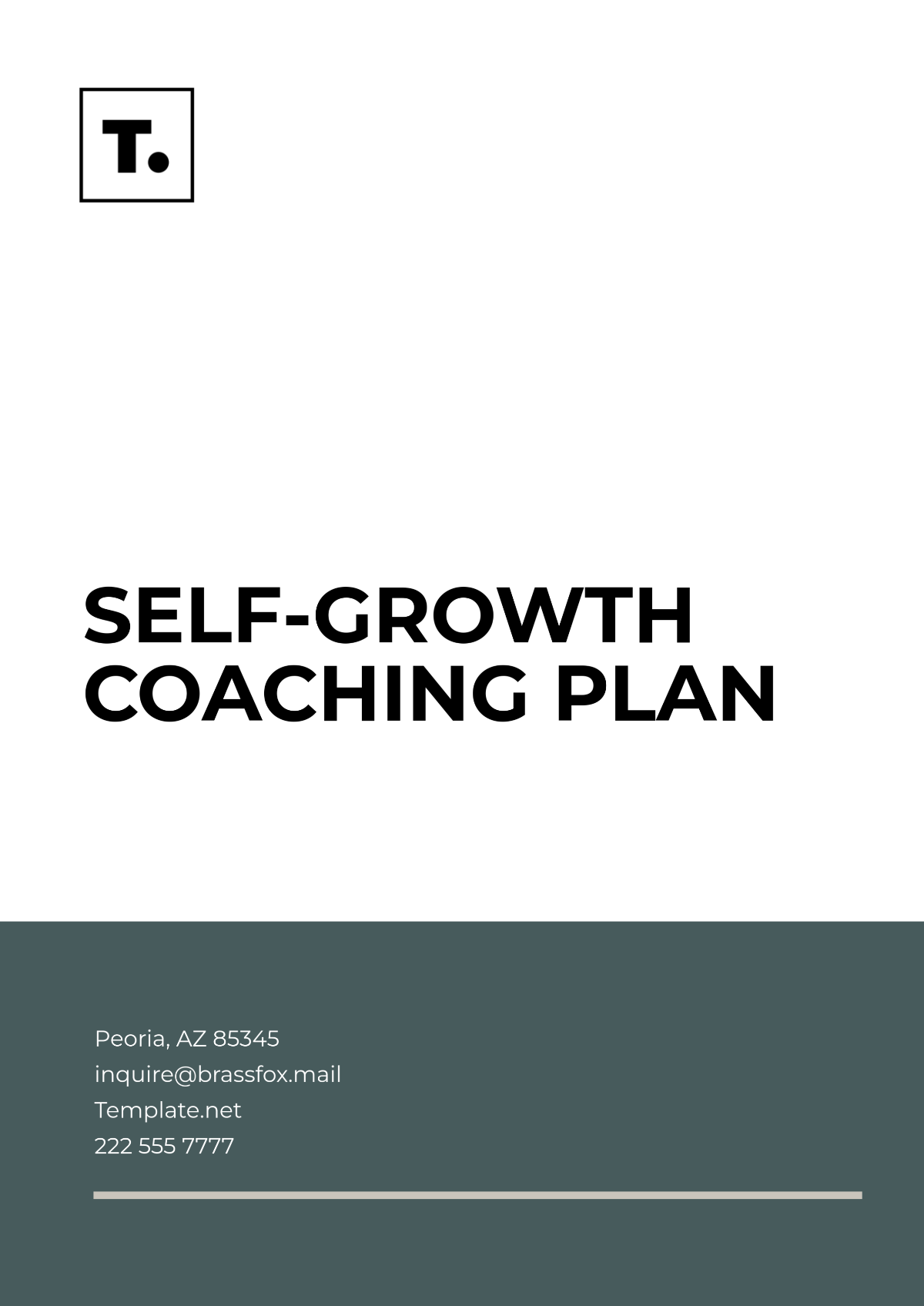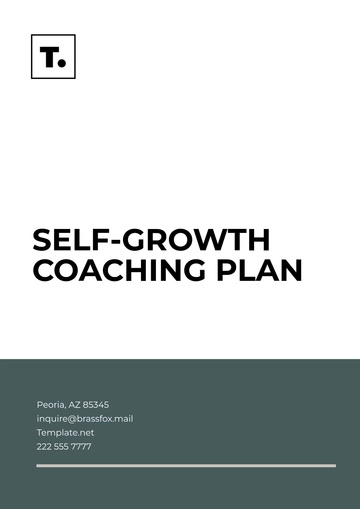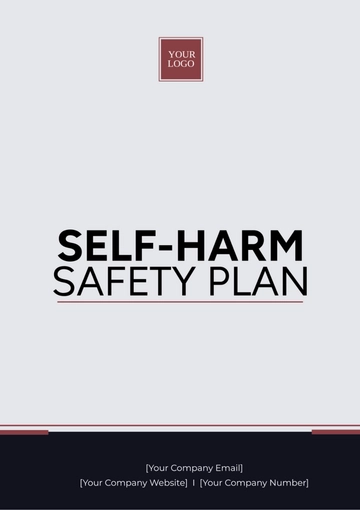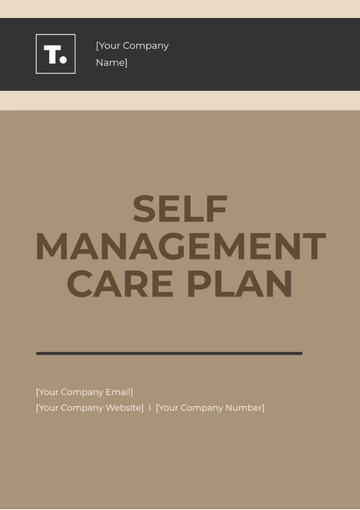Free Self-Growth Coaching Plan

Prepared by: [Your Name]
Date: [Date]
I. Introduction
This Self-Growth Coaching Plan is designed to empower you to unlock your full potential and create lasting personal and professional transformations. Through this structured approach, you will work on developing key areas of your life, from personal development and career advancement to health and wellness. This plan provides clear, actionable steps, strategies for overcoming challenges, and ways to track your progress. By the end of this plan, you will have gained not only the skills but also the mindset required to reach your goals.
II. Assessment
A. Current Strengths
Understanding your strengths is essential for building self-confidence and applying them effectively to achieve your goals.
Time Management: You have demonstrated the ability to meet deadlines and prioritize tasks efficiently, especially in work or academic settings.
Communication: Your ability to clearly express ideas and listen actively has fostered positive relationships in both personal and professional settings.
Problem-Solving: You tend to find creative solutions when facing challenges, which has been a key factor in your success in previous projects.
Resilience: You have overcome past challenges and continue to grow stronger from those experiences, demonstrating mental toughness and perseverance.
B. Areas for Improvement
No one is perfect, and recognizing areas for growth is an essential part of the self-improvement journey.
Procrastination: You sometimes delay tasks, especially when they feel overwhelming or outside your comfort zone, which affects your productivity.
Stress Management: High-pressure situations tend to create stress and anxiety, affecting your performance and emotional well-being.
Confidence: You occasionally doubt your abilities, especially when faced with new opportunities or challenges. This can lead to missed opportunities.
Work-Life Balance: You may have difficulty setting boundaries, leading to burnout and neglecting personal time.
III. Goals
A. Personal Development Goals
Setting personal development goals ensures that you grow not only in skill but also in self-awareness and emotional intelligence.
Goal | Objective | Action Step |
|---|---|---|
Build Emotional Intelligence | Develop the ability to recognize and manage your emotions effectively by practicing mindfulness and self-reflection. | Dedicate 5 minutes each day to a mindfulness practice, such as deep breathing or meditation, to build awareness of your emotions and reactions. |
Increase Self-Confidence | Identify and challenge your limiting beliefs by consistently stepping outside your comfort zone and celebrating small wins. | Start by volunteering for tasks that stretch your abilities and seek feedback after completion to learn and grow. |
B. Career Goals
In professional development, enhancing your career can be a powerful motivator. Setting clear career goals will give you a roadmap for advancing in your field.
Goal | Action Step |
|---|---|
Improve Leadership Abilities | Take on leadership roles in both professional and volunteer settings to practice guiding teams and making decisions. |
Action Step | Seek out a mentor who can help you develop leadership skills and actively seek feedback from peers on your leadership style. |
Enhance Networking Skills | Build strong relationships within your industry to create opportunities for career advancement. |
Action Step | Attend at least one networking event each month, whether virtual or in-person and aim to connect with at least three people at each event. |
C. Health and Wellness Goals
Prioritizing physical and mental well-being is crucial to maintaining energy and motivation in all areas of life.
Goal | Action Step |
|---|---|
Develop a Consistent Exercise Routine | Start with 3 times a week, incorporating activities you enjoy, such as yoga, cycling, or jogging, and gradually increase frequency as it becomes a habit. |
Implement Mindfulness Practices | Practice deep breathing or progressive muscle relaxation for 10 minutes every evening to release tension and promote relaxation. |
IV. Action Plan
Step 1: Establish Daily Habits
Consistency is key to progress. Establishing daily habits that support your goals will ensure long-term success.
Journaling and Self-Reflection: Spend 10 minutes every morning reflecting on your goals for the day and reviewing your progress from the previous day.
Suggestion: Use prompts such as "What am I most grateful for today?" or "What is one thing I can do to step outside my comfort zone today?"
Set Priorities: Create a to-do list with your top three priorities for the day, focusing on tasks that align with your growth goals.
Suggestion: Break larger tasks into smaller steps to avoid feeling overwhelmed and make steady progress.
Step 2: Enroll in Learning Opportunities
Growth often requires new knowledge and skills.
Online Courses: Enroll in courses that will help improve areas of weakness, such as communication, leadership, or stress management.
Suggestion: Platforms like Coursera, Udemy, or LinkedIn Learning offer a wide range of self-development courses.
Read Personal Development Books: Commit to reading at least one personal development book per month.
Suggestion: Recommended books include Atomic Habits by James Clear, The Power of Now by Eckhart Tolle, and Dare to Lead by Brené Brown.
Step 3: Seek Support
Having external support will help keep you accountable and motivated.
Coaching Sessions: Schedule bi-weekly or monthly coaching sessions to review your progress, receive guidance, and adjust your plan if necessary.
Suggestion: Select a coach whose expertise aligns with your development goals, whether in leadership, personal growth, or health.
Accountability Partner: Find someone who will support you in your journey by checking in regularly and offering constructive feedback.
Suggestion: This person can be a colleague, friend, or mentor who shares similar values and goals.
V. Progress Monitoring
A. Monthly Check-ins
Regularly assessing your progress ensures that you stay on track and make necessary adjustments.
Self-Reflection: At the end of each month, evaluate what has gone well and what needs more attention.
Suggestion: Answer questions like, "What goals did I achieve this month?" and "What obstacles did I face, and how can I overcome them next month?"
Track Achievements: Keep a record of small victories and milestones to motivate you.
Suggestion: Use a digital or physical tracker to mark achievements and visualize your progress.
B. Feedback from Others
Feedback helps you understand how others perceive your growth and where further improvements are needed.
Ask for Constructive Feedback: Regularly ask for feedback from colleagues, mentors, or friends to get an outside perspective.
Suggestion: Focus on specific areas, such as leadership, communication, or time management.
Apply Feedback: Use the feedback you receive to make adjustments and refine your approach.
Suggestion: Implement one piece of feedback at a time so that you can measure its effectiveness.
VI. Reflection
A. Self-Reflection Exercises
The most valuable insights often come from looking inward and reflecting on your journey.
Reflection Journals: At the end of each day or week, journal your thoughts on progress, challenges, and lessons learned.
Suggestion: Include questions like, "What did I learn about myself today?" and "How can I improve my approach tomorrow?"
Celebrate Milestones: Reflect on and celebrate each milestone, no matter how small, to reinforce positive habits.
Suggestion: Treat yourself to a small reward each time you reach a goal or complete a challenging task.
B. Adjusting the Plan
Your Self-Growth Coaching Plan should be flexible to adapt to new goals or circumstances.
Quarterly Reviews: At the end of every three months, review your overall progress and refine your goals as needed.
Suggestion: If a goal no longer aligns with your values or circumstances, replace it with a more relevant one.
Plan Adjustments: Make necessary adjustments to your action steps and strategies based on what’s working and what’s not.
Suggestion: Continuously ask yourself, "Is this still aligned with my long-term vision?"
- 100% Customizable, free editor
- Access 1 Million+ Templates, photo’s & graphics
- Download or share as a template
- Click and replace photos, graphics, text, backgrounds
- Resize, crop, AI write & more
- Access advanced editor
Fuel personal growth with our Self-Growth Coaching Plan Template from Template.net. This editable and customizable plan helps you create a clear roadmap for clients on their self-improvement journey. With editable fields in our Ai Editor Tool, tailor the plan to address specific goals and milestones. Whether it’s building confidence or overcoming challenges, this template is designed to facilitate lasting growth.
You may also like
- Finance Plan
- Construction Plan
- Sales Plan
- Development Plan
- Career Plan
- Budget Plan
- HR Plan
- Education Plan
- Transition Plan
- Work Plan
- Training Plan
- Communication Plan
- Operation Plan
- Health And Safety Plan
- Strategy Plan
- Professional Development Plan
- Advertising Plan
- Risk Management Plan
- Restaurant Plan
- School Plan
- Nursing Home Patient Care Plan
- Nursing Care Plan
- Plan Event
- Startup Plan
- Social Media Plan
- Staffing Plan
- Annual Plan
- Content Plan
- Payment Plan
- Implementation Plan
- Hotel Plan
- Workout Plan
- Accounting Plan
- Campaign Plan
- Essay Plan
- 30 60 90 Day Plan
- Research Plan
- Recruitment Plan
- 90 Day Plan
- Quarterly Plan
- Emergency Plan
- 5 Year Plan
- Gym Plan
- Personal Plan
- IT and Software Plan
- Treatment Plan
- Real Estate Plan
- Law Firm Plan
- Healthcare Plan
- Improvement Plan
- Media Plan
- 5 Year Business Plan
- Learning Plan
- Marketing Campaign Plan
- Travel Agency Plan
- Cleaning Services Plan
- Interior Design Plan
- Performance Plan
- PR Plan
- Birth Plan
- Life Plan
- SEO Plan
- Disaster Recovery Plan
- Continuity Plan
- Launch Plan
- Legal Plan
- Behavior Plan
- Performance Improvement Plan
- Salon Plan
- Security Plan
- Security Management Plan
- Employee Development Plan
- Quality Plan
- Service Improvement Plan
- Growth Plan
- Incident Response Plan
- Basketball Plan
- Emergency Action Plan
- Product Launch Plan
- Spa Plan
- Employee Training Plan
- Data Analysis Plan
- Employee Action Plan
- Territory Plan
- Audit Plan
- Classroom Plan
- Activity Plan
- Parenting Plan
- Care Plan
- Project Execution Plan
- Exercise Plan
- Internship Plan
- Software Development Plan
- Continuous Improvement Plan
- Leave Plan
- 90 Day Sales Plan
- Advertising Agency Plan
- Employee Transition Plan
- Smart Action Plan
- Workplace Safety Plan
- Behavior Change Plan
- Contingency Plan
- Continuity of Operations Plan
- Health Plan
- Quality Control Plan
- Self Plan
- Sports Development Plan
- Change Management Plan
- Ecommerce Plan
- Personal Financial Plan
- Process Improvement Plan
- 30-60-90 Day Sales Plan
- Crisis Management Plan
- Engagement Plan
- Execution Plan
- Pandemic Plan
- Quality Assurance Plan
- Service Continuity Plan
- Agile Project Plan
- Fundraising Plan
- Job Transition Plan
- Asset Maintenance Plan
- Maintenance Plan
- Software Test Plan
- Staff Training and Development Plan
- 3 Year Plan
- Brand Activation Plan
- Release Plan
- Resource Plan
- Risk Mitigation Plan
- Teacher Plan
- 30 60 90 Day Plan for New Manager
- Food Safety Plan
- Food Truck Plan
- Hiring Plan
- Quality Management Plan
- Wellness Plan
- Behavior Intervention Plan
- Bonus Plan
- Investment Plan
- Maternity Leave Plan
- Pandemic Response Plan
- Succession Planning
- Coaching Plan
- Configuration Management Plan
- Remote Work Plan
- Self Care Plan
- Teaching Plan
- 100-Day Plan
- HACCP Plan
- Student Plan
- Sustainability Plan
- 30 60 90 Day Plan for Interview
- Access Plan
- Site Specific Safety Plan


